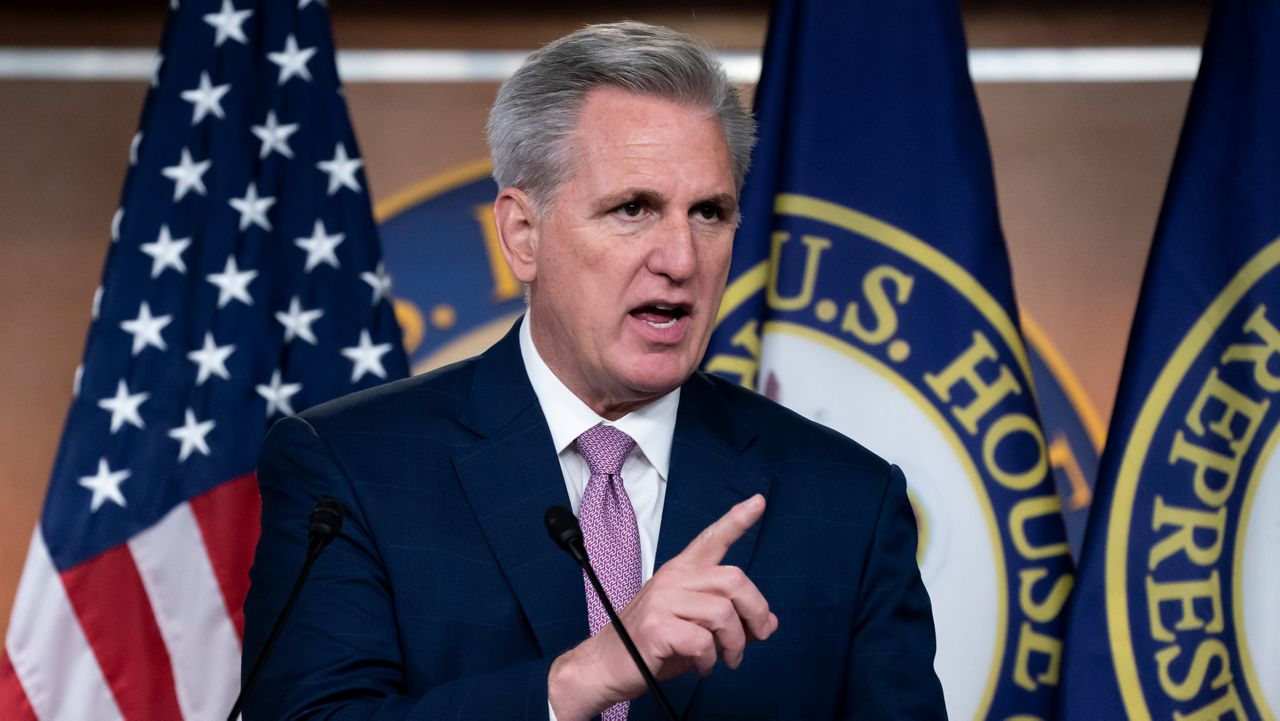House Minority Leader Kevin McCarthy is making clear that he will defy a subpoena from the House committee investigating the Jan. 6, 2021, Capitol attack, escalating a standoff with the panel over his and other Republican lawmakers’ testimony.
“For House Republican leaders to agree to participate in this political stunt would change the House forever,” the California lawmaker wrote Thursday in an op-ed in The Wall Street Journal with Rep. Jim Jordan, R-Ohio.
A spokesperson for the Jan. 6 panel said in a statement that “Leader McCarthy and other Members who have been served subpoenas are hiding behind debunked arguments and baseless requests for special treatment."
"Claims challenging the composition of the Select Committee and the legitimacy of its subpoenas have repeatedly failed in the courts," the spokesperson said. "The Select Committee has interviewed more than a thousand people, and the vast majority of witnesses who have been subpoenaed have complied with the law."
"The committee is working to provide the American people with answers about a coordinated scheme to overturn the 2020 election and a violent attack on our democracy so it can make legislative recommendations to ensure something like January 6th never happens again," the spokesperson continued. "The refusal of these Members to cooperate is a continued assault on the rule of law and sets a dangerous new precedent that could hamper the House’s ability to conduct oversight in the future."
The House panel believes testimony from the Republican lawmakers are crucial to their investigation as each of the men was in contact with then-President Donald Trump and his allies in the weeks and days leading up to the Capitol insurrection. Some participated in meetings and urged the White House to try and overturn the 2020 presidential results.
McCarthy has acknowledged he spoke with Trump on Jan. 6 as Trump’s supporters were beating police outside the Capitol and forcing their way into the building. But he has not shared many details. The committee requested information about his conversations with Trump “before, during and after” the riot.
His defiance presents a new challenge for the committee after lawmakers decided to take the extraordinary and politically risky step of subpoenaing their own colleagues. The committee now must decide whether to enforce the subpoenas even as it looks to wrap up the investigation and prepare for a series of public hearings in early June. It could refer the lawmakers to the House ethics committee or take steps to hold them in contempt.
The subpoenas were issued to McCarthy, R-Calif., Jordan, and Reps. Scott Perry of Pennsylvania, Andy Biggs of Arizona and Mo Brooks of Alabama in mid-May. The panel has already interviewed more than 1,000 witnesses and collected more than 100,000 documents as it investigates the worst attack on the Capitol in two centuries.
“I have no relevant information that would advance any legitimate legislative purpose,” Jordan said in a letter detailing his reasons for not cooperating. The others indicated after the subpoenas were issued that they too would not cooperate. A request for comment from Biggs, Brooks and Perry was not immediately returned.
The panel had previously asked for voluntary cooperation from the five lawmakers, along with a handful of other GOP members, but all refused to speak with the panel, which debated for months whether to issue the subpoenas.
McCarthy and the others were summoned to testify in front of investigators this week and next week. McCarthy, who aspires to be House speaker if Republicans take over the majority next year, indicated that the committee’s decision will have a lasting impact.
“Every representative in the minority would be subject to compelled interrogations by the majority, under oath, without any foundation of fairness, and at the expense of taxpayers,” he wrote in the op-ed.
In a separate move, McCarthy and the No. 2 House Republican, Louisiana Rep. Steve Scalise, filed a court brief in support of Donald Trump ally Steve Bannon, who is facing criminal contempt charges for defying a subpoena from the committee. In the brief, lawyers for the two write that the committee does not have the authority to issue subpoenas, an argument that has been dismissed in other court proceedings.
The lawyers also wrote that McCarthy and Scalise filed the brief “out of concern for the potential damage to House institutional,” rules and order.



